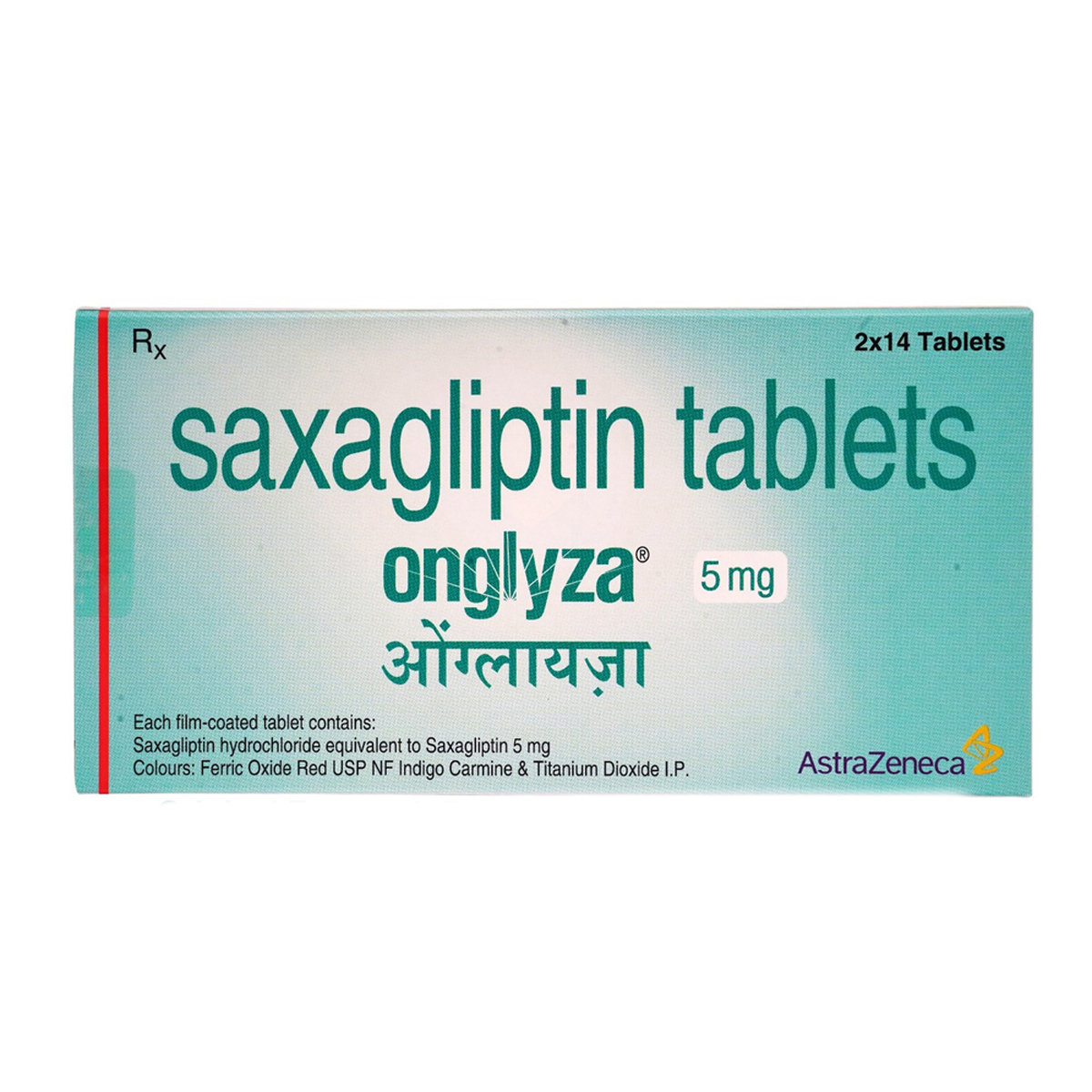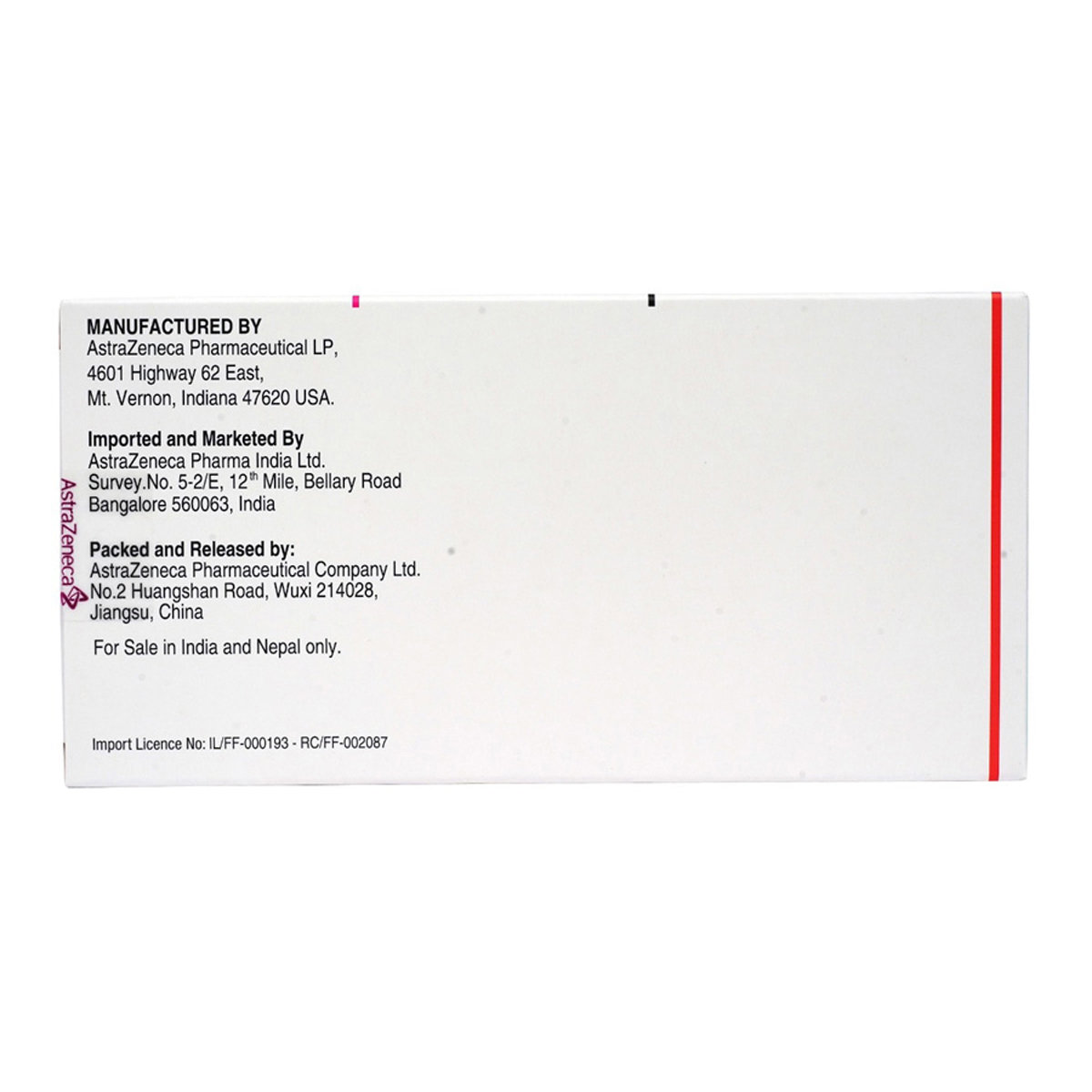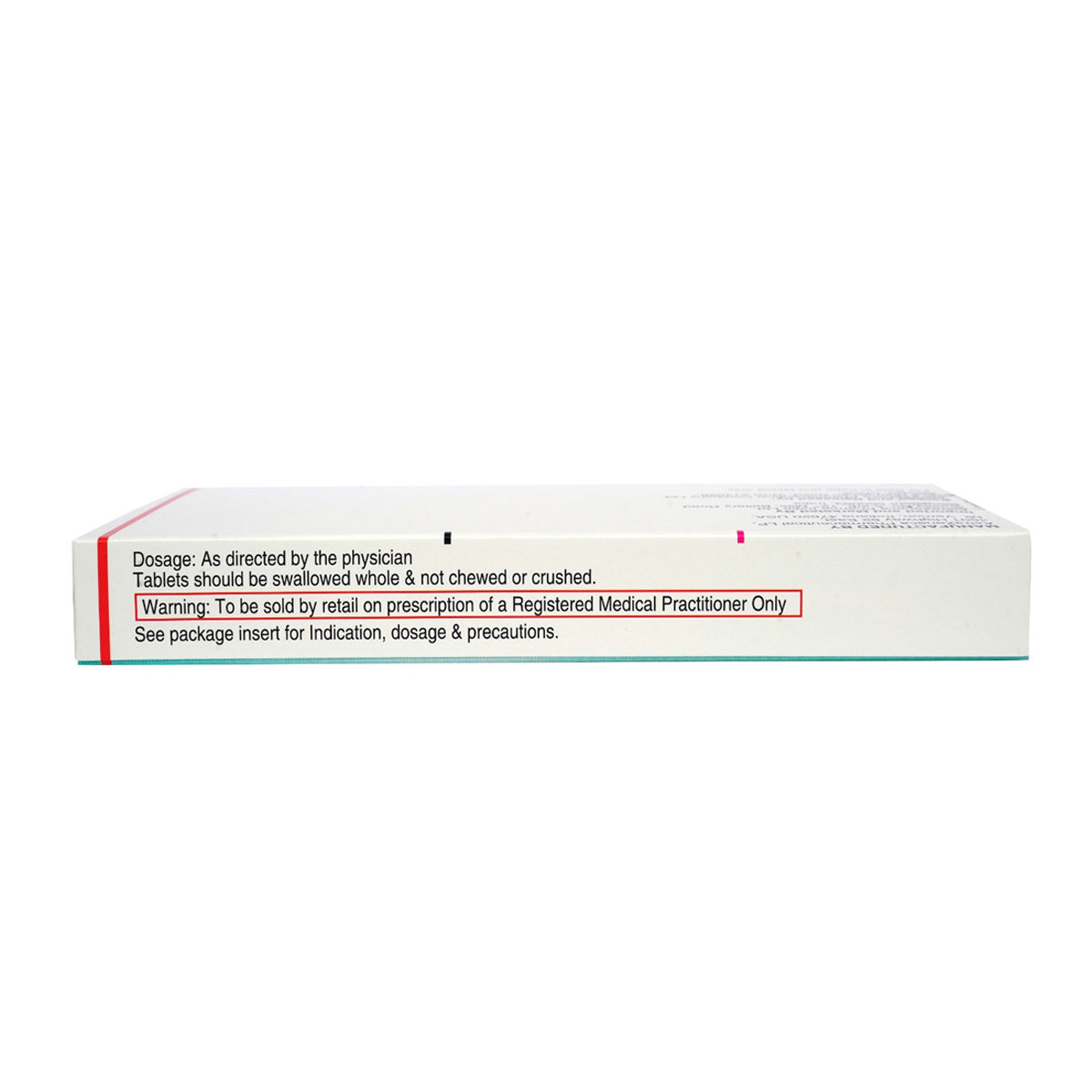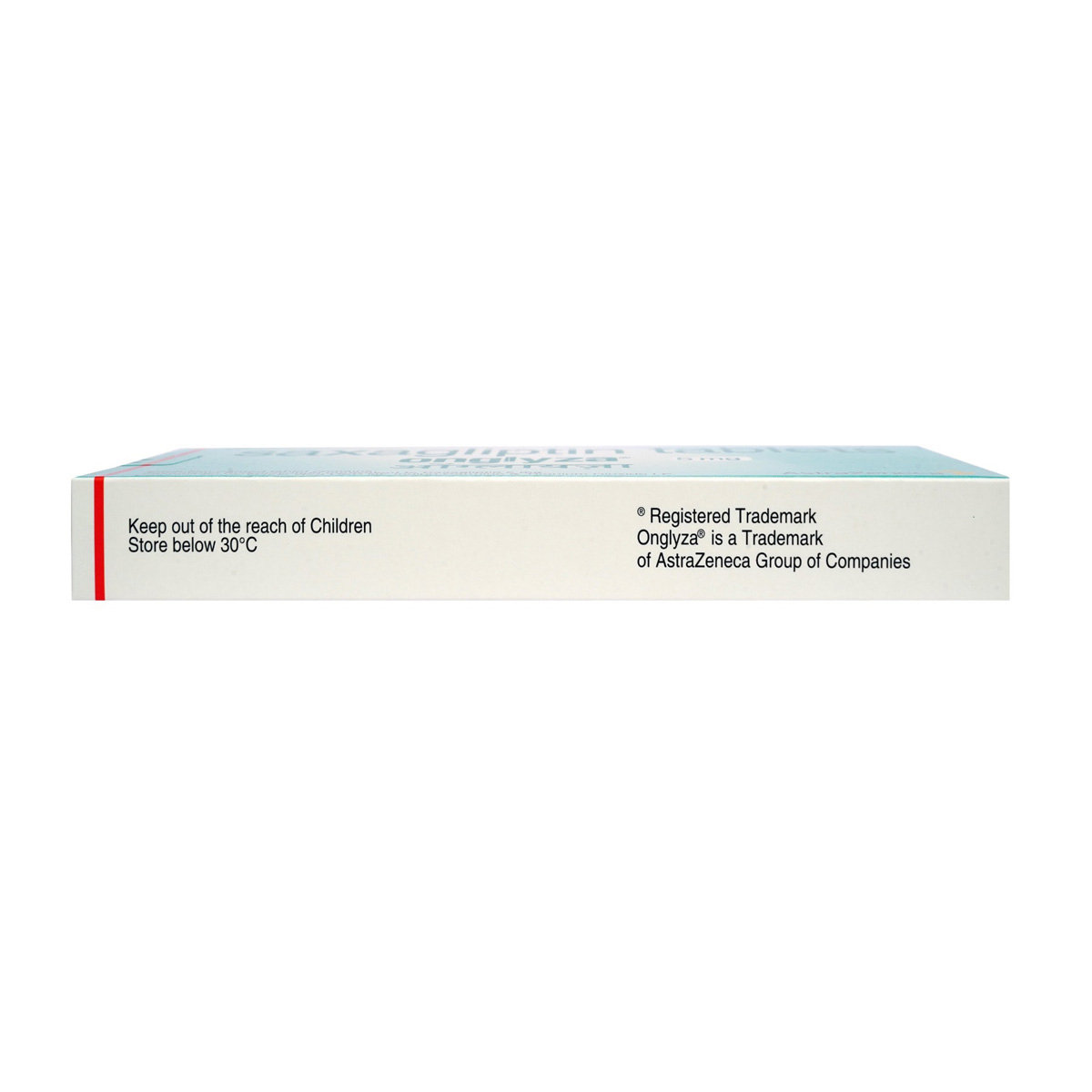Onglyza 5 mg Tablet 14's
MRP ₹623.5
(Inclusive of all Taxes)
₹93.5 Cashback (15%)
Provide Delivery Location
Online payment accepted
 Prescription drug
Prescription drugWhats That
Composition :
Manufacturer/Marketer :
Consume Type :
Expires on or after :
Return Policy :
NPPA :
About Onglyza 5 mg Tablet
Onglyza 5 mg Tablet contains saxagliptin which belongs to the class of dipeptidyl peptidase-4 (DPP-4) inhibitors used in the treatment of type 2 diabetes in adults. Onglyza 5 mg Tablet is prescribed for the condition of type 2 diabetes when diet and exercise alone cannot control their blood sugar levels. It is the first-line therapy for patients with type 2 diabetes that restores the body's response to insulin. Insulin is the hormone that controls sugar levels in your blood. People with type 2 diabetes either do not produce enough insulin or the insulin produced is unable to perform its function in the body (insulin resistance). Middle-aged or older individuals are most likely to suffer from type 2 diabetes, so it is also known as adult-onset diabetes.
Onglyza 5 mg Tablet work by blocking the action of DPP-4 (an enzyme which destroys hormone ‘Incretin’). The enzyme ‘Incretins’ help to produce more insulin only when required and reduce blood sugar level produced by the liver when not needed. Onglyza 5 mg Tablet should not be used in patients with type 1 diabetes and for the treatment of diabetic ketoacidosis.
Onglyza 5 mg Tablet should be taken with food or empty stomach. However, it should be taken at the same time of the day each time for best results. For better advice, your doctor will decide, what dose should be taken and it can change timely depending upon your condition. The most common side effect of Onglyza 5 mg Tablet are hypoglycemia (low blood glucose levels), upper respiratory tract infection, nasopharyngitis (infection of nose and throat with common cold) and headache.
Prolonged intake of Onglyza 5 mg Tablet may cause acute pancreatitis (swollen pancreas), and critical kidney problem. Increased risk of hypoglycemia (low blood sugar level) can occur when Onglyza 5 mg Tablet is added to other anti-diabetic agents or insulin therapy. In this case, your doctor may adjust the dose of Onglyza 5 mg Tablet . Severe allergic reactions might occur in some patients taking Onglyza 5 mg Tablet like anaphylaxis, angioedema (swelling under the skin), and exfoliative skin conditions including Stevens-Johnson syndrome. Safety and efficacy of Onglyza 5 mg Tablet in children under 18 years have not been established, so it should not be given to them. Patients taking digoxin (a heart medicine) with Onglyza 5 mg Tablet should be closely monitored as severe drug interaction has been observed.
Uses of Onglyza 5 mg Tablet
Directions for Use
Key Benefits
Onglyza 5 mg Tablet work by blocking the action of DPP-4 (an enzyme which destroys hormone ‘Incretin’). The enzyme ‘Incretins’ help to produce more insulin only when required and reduce blood sugar level produced by the liver when not needed. Thus, Onglyza 5 mg Tablet plays a vital role in controlling blood sugar levels and prevents serious complications of diabetes like eyesight loss (retinopathy), kidney (nephropathy), nerve damage (neuropathy), diabetic foot ulcer and delayed wound healing.
Storage
- Inform your doctor about your anxiety symptoms so that you doctor may explore potential drug interactions and alter your treatment plan.
- Work with your doctor to adjust your medication regimen or dosage to minimize anxiety symptoms.
- Reduce anxiety symptoms by practicing relaxation techniques like meditation, deep breathing, or yoga.
- Regular self-care activities, such as exercise, healthy food, and adequate sleep, can assist control anxiety.
- Surround yourself with a supportive network of friends, family, or a support group to help manage anxiety and stay motivated.
- Regularly track anxiety symptoms and report any changes to your doctor to ensure your treatment plan is effective and adjusted as needed.
- Body pain can be treated with regular exercise or yoga, which includes mild stretching, which helps strengthen the lower body.
- Warm baths and gentle massage of the affected parts can help relieve pain.
- Avoid strenuous activity and take frequent breaks, as rest is critical.
- Intake of nutritious food can help strengthen body and mind. A trained nutritionist can help design a balanced diet for strengthening your body.
- Speak to your doctor if the pain lasts an extended period. Medical help can be practical in finding a cure for constant body pain.
- Rest well; get enough sleep.
- Wear comfortable layers of clothes and get to a warm place.
- Drink warm fluids like coffee, tea or hot chocolate.
- Warm up using a blanket or heating pad.
Drug Warnings
Increased risk of hypoglycemia (low blood sugar level) can occur when Onglyza 5 mg Tablet is added to other anti-diabetic agents or insulin therapy. In this case, your doctor may adjust the dose of Onglyza 5 mg Tablet . Prolonged intake of Onglyza 5 mg Tablet may cause acute pancreatitis (swollen pancreas), and critical kidney problem. Severe allergic reactions might occur in some patients taking Onglyza 5 mg Tablet like anaphylaxis, angioedema (swelling under the skin), and exfoliative skin conditions including Stevens-Johnson syndrome. Safety and efficacy of Onglyza 5 mg Tablet in children under 18 years have not been established, so it should not be given to them. Patients taking digoxin (a heart medicine) with Onglyza 5 mg Tablet should be closely monitored as severe drug interaction has been observed.
Drug-Drug Interactions
Drug-Drug Interactions
Login/Sign Up
Coadministration of Onglyza 5 mg Tablet with Gatifloxacin may sometimes affect blood glucose levels. Both high blood glucose and, less frequently, low blood glucose have been reported.
How to manage the interaction:
Although there is a possible interaction, Onglyza 5 mg Tablet can be taken with Gatifloxacin if prescribed by the doctor. Consult the doctor if you experience nervousness, confusion, headache, dizziness, drowsiness, tremors, nausea, hunger, weakness, perspiration, palpitation, rapid heartbeat, urination, thirst, and hunger. Monitoring blood glucose levels is advised. Do not discontinue any medications without first consulting your doctor.
Coadministration of Bexarotene and Onglyza 5 mg Tablet can increase the risk of developing pancreatitis (inflammation of the pancreas).
How to manage the interaction:
Co-administration of Bexarotene and Onglyza 5 mg Tablet can lead to an interaction, it can be taken if advised by your doctor. However, if you experience any symptoms like persistent nausea, vomiting, abdominal tenderness, and upper abdominal pain, especially that which is made worse after eating or radiates to the back, consult your doctor immediately. Do not discontinue any medications without first consulting your doctor.
As tirzepatide and Onglyza 5 mg Tablet both work through similar pathways in the body, it is possible that using them together may result in an increase in side effects.
How to manage the interaction:
Do not stop using any medications without first talking to your doctor.
Drug-Food Interactions
Drug-Food Interactions
Login/Sign Up
Diet & Lifestyle Advise
- Invest at least 150 min of your week in moderate-intensity physical activity or one hour and 15 minutes of high-intensity exercise every week.
- Losing weight gradually to achieve a healthy body mass index (18.5 to 24.9).
- Replacing refined carbohydrates containing foods with whole grain foods and increase intake of fruits and veggies and other fibre enriched foods.
- Reduce intake of saturated fat (or hidden fats) in the food like chips, crisps, pastries, biscuits and samosas. Choose omega 3 fatty acid-containing oils for daily cooking. For frying, you can use palm oil, mustard oil, groundnut oil, rice bran oil, and safflower oil.
- Avoid taking too much stress as it may elevate your blood sugar level. You can adopt stress management techniques like mindfulness to control stress-related blood sugar changes or meditation or yoga.
- Opt for low-fat dairy products (low-fat yoghurt, fat-free milk and cheese etc.).
- Keep your blood pressure as normal (140/90) as possible as it reduces the risk of cardiovascular diseases in diabetes patients.
Side Effects of Onglyza 5 mg Tablet
- Hypoglycaemia (low blood glucose levels)
- Upper respiratory tract infection
- Nasopharyngitis (infection of nose and throat with common cold)
- Headache
Habit Forming
Therapeutic Class
All Substitutes & Brand Comparisons
RX
Glisaxapin 5 Tablet 15's
Steris Healthcare
₹285
(₹19.0 per unit)
52% CHEAPERRX
Out of StockZaglivia 5mg Tablet
Hauz Pharma Pvt Ltd
₹430
(₹38.7 per unit)
3% CHEAPERRX
Out of StockZaxaglit 5mg Tablet
₹432
(₹38.88 per unit)
3% CHEAPER
Author Details
We provide you with authentic, trustworthy and relevant information
Drug-Diseases Interactions
Drug-Diseases Interactions
Login/Sign Up
FAQs
Drug-Drug Interactions Checker List
- BUPROPION
- CIPROFLOXACIN
- CIMETIDINE
- DIGOXIN
- DOLUTEGRAVIR
- TOPIRAMATE
- RANOLAZINE
- ASPIRIN
Disease/Condition Glossary
Type 2 diabetes is a condition where the body is unable to make sufficient insulin, or the insulin that it makes doesn't work properly or utilized by our body. This can cause high blood sugar levels (hyperglycemia). Symptoms of type 2 diabetes include increased thirst, frequent urination, increased hunger, fatigue, and blurred vision. In some cases, there may be weight gain while in rare cases weight loss may be observed. The complication of type 2 diabetes also includes neuropathy (nerve problems), nephropathy (kidney problems), and retinopathy (damaged retina of eyes or blindness), loss of limbs, sexual dysfunction, and increase the chance of heart attack or stroke.

Have a query?
Alcohol
Safe if prescribed
Onglyza 5 mg Tablet is not advised to be taken with alcohol as it causes bizarre interactions. Both hypoglycemia (low blood sugar) and hyperglycemia (high blood sugar) may occur, depending on how much and how often you drink.
Pregnancy
Consult your doctor
No harmful interaction has been reported in pregnant mothers yet the patient is advised to consult a doctor before taking this drug during pregnancy.
Breast Feeding
Consult your doctor
No harmful interaction has been reported in breastfeeding mothers yet the patient is advised to consult a doctor before taking this drug.
Driving
Safe if prescribed
Caution is to be taken. If a patient feels dizzy while taking Onglyza 5 mg Tablet , do not drive or use any tools or machines. Hypoglycaemia may affect your ability to drive and use machines or work with a safe foothold and there is a risk of hypoglycaemia after taking this medicine in combination with other medicines known to cause hypoglycaemia such as insulin and sulphonylureas.
Liver
Consult your doctor
Caution is to be taken in liver patients. Patients with severe liver problems are not advised to take this drug without doctor's consultation.
Kidney
Consult your doctor
Caution is to be taken in kidney patients. Patients with reduced kidney function are advised to consult with a doctor before taking Onglyza 5 mg Tablet as the doctor may decrease the dose as per his own judgment.
Children
Safe if prescribed
Onglyza 5 mg Tablet is not recommended for children and adolescents under 18 years. It is not known if this medicine is safe and effective when used in children and adolescents under 18 years of age,thus doctors consultation is required.














